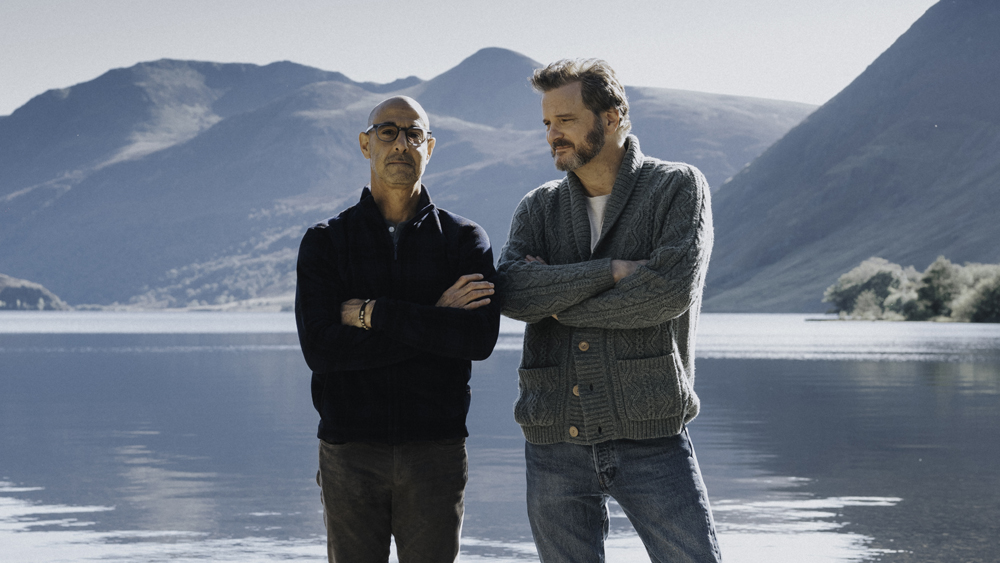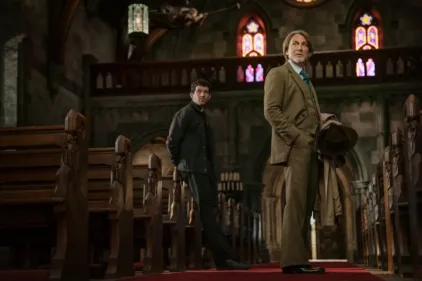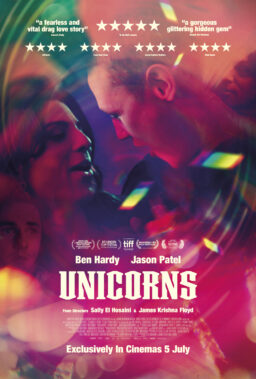“Supernova,” from actor-turned writer/director Harry Macqueen, is a tender but bittersweet love story about a long-time couple on a road trip to see favorite places and people as one of them struggles with memory loss. In an interview, Macqueen talked about what he learned about making films as an actor reading scripts and observing directors, and what actors Colin Firth and Stanley Tucci brought to his film that was even more than he envisioned.
You’ve written and directed two films so far and both have been about literal journeys, with two characters on the road.
Really the literal journey, mirroring or running alongside at least, an emotional journey is always quite an interesting way of telling a story. And also, the way that you hope to use a landscape within that cinematically can be very powerful. So, those things have always appealed to me about road movies in general. And also, just the sort of originality really, doing one in the UK, because we don’t really make road movies very much here. I think I was aware quite from very early on with the film that I didn’t really want to make this a domestic drama about two people living at home. I thought it was an original and interesting way of telling the story to put it on the road and to offset the sort of the micro and the macro really; because you’ve got this small, intimate journey within this vast landscape, both emotional and literal. So, all of those things really sort of fed into my decision to make another road movie of sorts.

One thing that particularly impressed me about the film is the way it portrays a very long-term, lived-in relationship, with all the affectionate, bantering, and bickering that reveals a long history. How did you work on that in the script and with the actors?
It’s a team effort to get that right and it does extend all the way through to production design, and how you shoot the film, and of course, perform it. But it starts with the script; it has to start with the script. Obviously, a writer knows the characters incredibly well so you sort of form a relationship as solidly as you possibly can in that part of the process. And you want to try and make it as grounded as possible, really, as subtle and nuanced. And that obviously then extends to performance. Colin and Stanley do it just so remarkably. What they bring out of each other in the film it is surprising as it is or seems effortless, really, in a way, and exactly what I hoped it would be, subtle and nuanced and complex. Colin and Stanley definitely were helped by the fact that they have an enormous amount of trust with one another, because they’ve known each other for some time, and they’re so close. So, I think bringing a lot of that sort of natural energy that they have in their relationship into this relationship was a big part of that. But then of course, it was a difficult job for them because they have to step away from their off-screen relationship. You sort of use what is worth using, what is helpful, and then you have to re-contextualize the rest of it in keeping with the character in the situation.
There is such a striking moment in the film early on when Stanley Tucci’s character, Tusker, wanders off, and Colin Firth’s character, Sam, is frantic. And yet the resolution of that scene, when Sam finds him, is shot from the perspective of the driver’s seat in the camper, through the windshield. Tell me about that choice.
Well, I think one of the things that I was really interested in with this film was trying to avoid melodrama. The film comes from a long period of intense research for me. And what I found when I was spending a lot of time with people who are living with this condition is that melodrama, and high drama happen, but it’s actually reasonably rare. The drama for this kind of relationship is constant, actually. It’s constant low-level drama. And so, I think the film reflects that and that is the way I wanted to shoot it.
The atmosphere of the film, in general, was to be as truthful as I could and also be as authentic as I could to that. So, being at times almost voyeuristic with the way we shot it, and certainly removed and restrained, not emotionally removed, I hope, but certainly, cinematically poised, I think seemed to be a really truthful way of telling this story. It’s a very difficult thing to pull off. But you try and you make it look easy and poetic, which is one of the things we were trying to do with the film, certainly. That seems like a good example because a very obvious way of shooting it would be to go into them in tight close-up and see their emotions. But actually sitting back a bit allows them to have a private moment away from the audience, which I think was key at that point.

There’s a long scene near the end where they argue and both of them have good points to make. The big question, though, is who gets to decide? Who casts the deciding vote?
When you’re put in this situation there is no answer to it, really. And I think that’s one of the reasons that I wrote it. Those arguments are strong. The back and forth is as strong on both sides. It’s just an incredibly complex thing to find an answer to. And I think it extends to the sort of the ending of the film itself, really. I always wanted to leave the film poised hanging on a precipice, because that’s what these characters are doing. That felt the most truthful way of presenting this conversation or debate about end of life choices certainly. Because I think there’s no answer sometimes, and I think that’s fine. And it’s important to explore that as much as it is to find an answer within a film. When films or books or piece of theater or anything leave you asking perhaps more questions than you are allowed to answer, I feel like it’s a bit of a gift really from the filmmaker or the writer to you, the audience, to take the story away into your own life and make of it what you will. I’ve always found that quite rewarding as a film watcher. So, something that I was interested in doing here.
What did your experience as an actor teach you about screenwriting? How did that inform the way that you write?
First and foremost, I write for the characters and for the actor, or actress. That’s the first thing that takes place in my process, really. The characters come first, and then other things are informed by that rather than necessarily the other way around. I always want to try and write for actors, the kind of parts that I would like to have myself, maybe is a good way of thinking about it. And I think that this project certainly there’s no question that the exercise was really kind of simplicity of narrative, complexity of character.
As an actor, you’ve had an opportunity to work with some great directors, including one of my favorites, Richard Linklater. What have you learned from them, that you brought to your own directing?
Well, with Rick specifically, I had a very small part in his film, [“Me and Orson Welles“]. But I was there a good month, making it. And so, I spent quite a lot of time hanging out with him and being directed by him, obviously. And I think his style of directing is very reflective of his films. He’s really, really laid back. And he makes everything fun. And I think he wants to have a good time making the film. To be honest, that is as important, the way you make the work is just as important as the outcome of the work itself. And you do have a duty as a filmmaker, to make the experience collaborative and enjoyable for everyone doing it. Because as you know, making a film is really difficult all the time. So, I definitely learned that from him. I was rightly inspired by how relaxed and free he was with his actors and with his direction.

You talked about doing research and clearly, you know something about people with dementia, but apparently, you also studied the caregivers as well.
Yes, exactly. I spent a lot of time learning all sides of the equation, really. So, the medical aspect of it, the sort of biology of it, but also really, really importantly spent an enormous amount of time with families and couples, who are living this life. And if you do that over two or three years, which is what I was doing, and I still do it, you see those relationships change. You obviously see the person change, which is really interesting, and also desperately sad and funny and life-affirming and all of those things. But also you see how relationships change around that person to accommodate for that disintegration of character, and that is what really drew me to making this film.
In a way it’s slightly more a story about the caregiver than it is a story about the person that is suffering with the condition. And I think that the way that relationships have an equal partnership and then become very unequal when one person within that has to become a caregiver. So, you go from being a lover to a caretaker. I think that what was really interesting to me. And that actually was one of the things that affected me emotionally more than anything else when I was doing my research. Because I think ultimately having any form of dementia is, of course, an incredibly challenging thing for anyone to go through. But you can’t ignore the fact that at some point in that dementia journey, you will not know you are ill anymore, you won’t know who you are any more. So, what you’re then left with is the collateral damage for the people around that person. And that’s very interesting. And watching a loved one unravel and losing a loved one almost piece by piece, week by week for a long, long time is a really quite incredible thing to go through.
Colin Firth and Stanley Tucci give gorgeous performances in the film. What did they show you about your characters that you hadn’t quite realized when you wrote it?
Oh, so many things. I would be here all day talking about that. But I think the honest answer really is the nuance that they imbued each character with. Because the script is naturally very subtle, and it’s short, and there’s not a lot of exposition, and you’re actually throwing the audience straight into a situation that they absolutely have to believe in right from the start because there’s nothing to help you really; it’s the actors and that’s it. So, I think that what they brought to both roles was an enormous amount of compassion. And I think they always do that as actors. That was one of the things that appealed to me about working with them in the first place before I even met them. They have such a big, well of empathy that they draw from, and that they give to their characters. And I think that’s kind of amazing.
The film was inspired by some really important experiences that I had and a lot of time that I’d spent with people that are living through this sort of experience, and that was life-changing thing for me. It was just so important to make sure that the characters were played with integrity and complexity. Stanley also taught me how to make cocktails, so there’s that!
“Supernova” is in theaters today.












